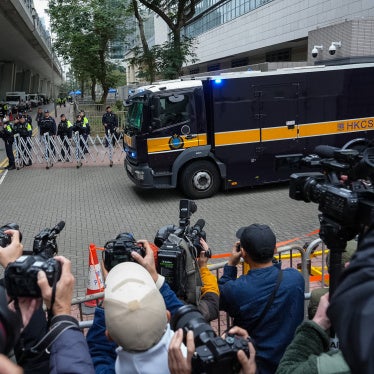Over the past four days, more than 700,000 people in Hong Kong have presented the Chinese government with one of its worst nightmares: a peaceful process that challenges Beijing's authority under international law. As of June 23, according to some estimates, as many as one in five registered voters have cast ballots through a non-binding, city-wide referendum to choose among three proposals for political reform in Hong Kong -- ignoring threats from the ruling Chinese Communist Party in the process.
The challenge Beijing faces is clear: should it grant real autonomy to Hong Kong's 7.2 million citizens, and allow them to decide whom to elect and how? Or should it try to crush democratic aspirations among its citizens, as it has done many times before?
On June 20, Occupy Central with Love and Peace, a democracy advocacy group founded by academics in Hong Kong, launched the 10-day vote, which is open to people carrying Hong Kong identification cards. Beijing has promised Hong Kongers universal suffrage. But people in Hong Kong -- although freer than their compatriots on the mainland -- have long been denied full political rights. Hong Kong was under British colonial rule since the early 1840s, but its first legislative elections were not held until 1991. The Basic Law, Hong Kong's quasi-constitution which went into effect in 1997, envisioned progress towards universal suffrage for all elected offices as early as 2007 and guarantees the territory a "high degree of autonomy."
This, however, is not true in practice. Under its byzantine electoral system, all eligible voters can cast a ballot in a geographical constituency, while several thousand people have an additional vote via professional or "functional" constituencies in the Legislative Council, the territory's legislature. Only 1,200 people -- hand-picked by Beijing -- get to vote for the territory's chief executive. The fundamental problem is that the vote of one elector is not, as stipulated by international law, equal to the vote of another.
Over the decades, Beijing, pro-China leaders in Hong Kong, and many in the territory's important and influential business community, have repeatedly claimed that the territory's citizens are interested only in making money, not in politics. But Hong Kong regularly posts respectable turnout rates for elections, and tens of thousands in the territory participate each year in the candlelight vigil to commemorate the anniversary of Beijing's Tiananmen Massacre.
Some casting ballots via Occupy Central with Love and Peace have expressed growing frustration and a sense of marginalization. In diverse policy areas -- from planning for a new town to education policy -- the Hong Kong government has failed to respond to the interests of the majority.
Hong Kong and Beijing authorities should see this vote as demonstrating deep dissatisfaction with the status quo. Without the long-promised electoral reforms, some Hong Kongers will continue to consider their government as doing the bidding of the territory's privileged few and of Beijing, and will continue to oppose many of its policies.
For the Chinese Communist Party, the idea of allowing greater political rights in Hong Kong appears to be anathema. After all, for 60 years it has insisted that it is the people's choice of governing party -- while refusing to allow a vote that might disprove that belief. In Hong Kong, Beijing has long made its views clear by insisting that it would decide who should be eligible to run the territory based on that person's "loyalty" and "patriotism." Worryingly, on June 10 Beijing issued a white paper that appeared to gut key elements of the Basic Law, including Hong Kong's autonomy, and the idea that the nomination process for chief executive could be made democratic. Anyone relying on Chinese compliance with agreed international treaties should be worried by such conduct.
If Chinese central and Hong Kong authorities fail to generate proposals for electoral reform in Hong Kong that conform to international standards, Occupy Central with Love and Peace has pledged to take its online activism on to the streets, in a gesture of peaceful civil disobedience. Judging by Chinese leaders' reactions to popular demands elsewhere -- whether from house church members, ethnic minorities, or urbanites concerned about the environment -- Beijing's response is unlikely to be moderate.
Meanwhile, the international community has been largely silent in the face of Beijing's threats and intimidation towards Hong Kong. The United States, European Union, and Britain all backed the international treaty known as the Joint Declaration that governed Hong Kong's return to Chinese sovereignty and set out unambiguous human rights guarantees -- and all have identified progress towards political rights in Hong Kong as a priority. Now is the time for them to loudly voice their support for basic rights and freedoms.
Many Hong Kong citizens have made their views perfectly clear. From the right to participate in politics, the right to express those views, and their right to demonstrate peacefully as a means of manifesting change, international law is on their side. Who else is?






